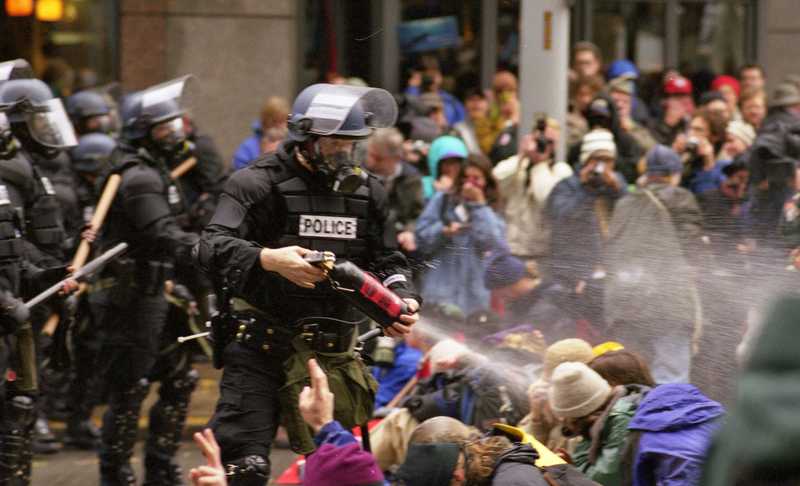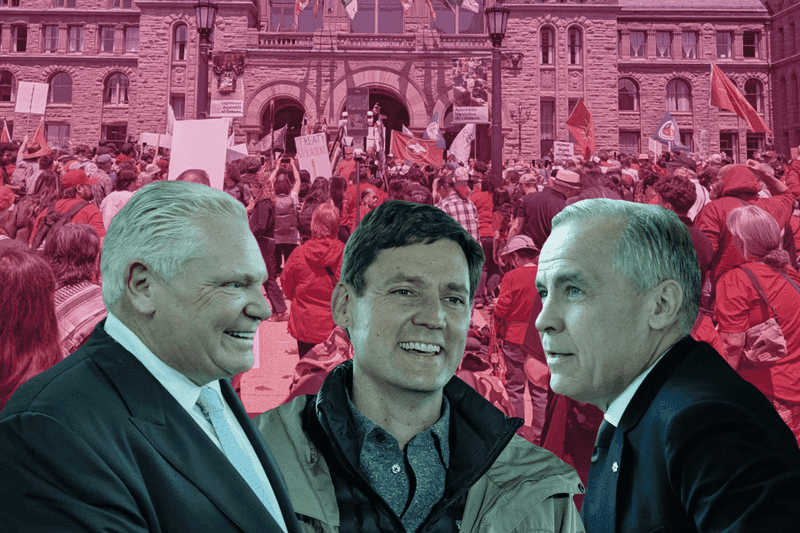
On November 30, 1999, protesters disrupted the ministerial meeting of the World Trade Organization in Seattle. The crown jewel of neoliberal globalism, the WTO was supposed to create one law for the world economy, with the goal of permanently securing free trade for all. The Seattle activists, most of them leftists, opposed the organization for placing the rights of corporations beyond democratic control.
It took 20 years, but the WTO now appears to be on its deathbed. Barring any last minute surprises, it will cease to function altogether next month as the Trump administration continues to block the appointment of new judges to the appellate body.
Does this mean “the Seattle protesters might finally win, thanks to Trump,” as Bloomberg News columnist Noah Smith remarked?
It does not. In fact, the suggestion itself shows how badly we misunderstand both the present and the past. We hear time and again that we are in an era of the open versus the closed society, of cosmopolitanism versus isolation. Enemies of enemies must be friends. Thus, to be opposed to the WTO must mean being aligned with Trump. It’s the world or the nation: You can choose only one.
But this story is wrong, and even ridiculous. Beyond a tiny fringe, no serious political formation today is demanding autarky, self-reliance, or a significant withdrawal from the global economy. What almost everyone wants is a revision to the status quo of the “Long 1990s” that lasted from the inception of the WTO, NAFTA, and the EU’s Maastricht Treaty through the ruptures of Trump, Brexit, and the 2010 eurozone crisis.
We are not witnessing a battle between globalists and nationalists but—as in 1999—a clash of differing concepts of globalization. To use the term of the 1990s, alter-globalization is back. But this time, it’s coming from both the left and the right.
Take the well-documented WTO protests of 1999. What do you see in the archival footage? Not demands for walls or vilification of foreign competition in the style of Trump, but rather a celebration of diversity and the international nature of political struggle. One of the best-known documentaries of the protest begins with a brown-skinned South Asian woman in a sari and bindi, Vandana Shiva of the International Coalition on Globalization, saying that “the denial of shaping your economy is an end of democracy.” Minutes later we see a man speaking in front of a crowd, telling them to “make sure the governments of the leaders around the world will never forget this day, the 20th of November, 1999.” This man of African descent is Leroy Trotman, of the Barbados Workers Union. “This demonstration is not a demonstration of the United States,” he continues, “it is a demonstration of all working-class people all over the world rich country, poor country, white country, black countries, all countries.”
“A lot of working-class people in this country don’t make the link,” an American Latino organizer says later, “that they are linked directly with people in Mexico City and what happens to those folks happens to them, not even immediately, but, damn, it will happen.” Another organizer with dark skin in a leather jacket with the nom de guerre “War Cry,” says, “Our differences are our strengths. I don’t think anybody wants to live in a homogeneous culture.”
Interconnection, globality, diversity: Here are all the buzzwords of the 1990s—the very ones commodified and packaged to sell everything from dress socks to welfare reform. And it’s true that both left-wing alter-globalization and what is now condemned by some as “progressive neoliberalism” share, at least on the surface, this lingua franca, made popular by Benetton, Coca-Cola, and London’s Millennium Dome. Still, their messages couldn’t be more different.
The Seattle activists accepted globalization as a fact, while asking what institutions would make it work toward social justice and not disempowerment and inequality. The search was for institutions that, in the parlance of the time, put people over profit.
The shorthand most often used for the protesters in Seattle is an alliance between “Teamsters and turtles,” referencing the common front of organized labor and environmentalist groups. The introduction of labor standards and environmental standards into trade agreements were two core demands made by people in the streets. Both of those demands were and are routinely dismissed by the judgments of the WTO as unfair barriers to trade.
Does this mean global economic governance itself is impossible? How could such goals be pursued except through alternative forms of international organization? The Seattle demonstrators weren’t blind to these challenges. They sought alliances with diplomats and indigenous activists across the Global South to create new institutions. The goal was not to drop out of globalization but to reshape it.
Twenty years later, the protesters in Seattle look more right than wrong. The WTO never solved its democracy problem. The inequality produced by ignoring the demands of labor fed the rise of disruptive social movements and insurgent political parties. Ecological issues are at the center of every serious agenda. A less obvious leitmotif is taxation. Attac, an organization founded in France in the wake of the 1995 protests, originally stood for “Action for a Tobin Tax to Assist the Citizen,” and agitated for a small tax (as proposed by economist James Tobin) on the financial transactions that surged after the mid-1990s. These demands resonate today in the work of progressive economists like Thomas Piketty, Emmanuel Saez, and Gabriel Zucman, as well as the party manifestos of Jeremy Corbyn’s Labour Party and the stump speeches of Democratic candidates Elizabeth Warren and Bernie Sanders. Looked at this way, the protesters didn’t lose. They prefigured political demands that have become ever more mainstream.
Left-wing alter-globalizers sought—and many still seek—to transform global economic governance, reorient it to aims that might win greater legitimacy from populations that feel left out of the gains of the explosion of cross-border financial activity and trade from the late 1990s onward. This is a far cry from the right’s image of globalization, which includes shredding global environmental agreements, lowering corporate taxes to the bare minimum, and using tariffs to dominate geopolitical rivals. The absurdity of the claim that Trump is realizing the demands of protesters, then, should be beyond clear.
Trump’s version of alternative globalization can be understood through actions of one of his cabinet members, Commerce Secretary Wilbur Ross, some years before Seattle—which, far from being the only protest of its kind, followed the Zapatista uprising in Chiapas, Mexico, in January 1994; a major public employees strike in France in December 1995; and the largest organized strikes in history in January 1997 in South Korea. That was where Ross’s investment fund—a so-called “vulture fund” designed to buy and sell distressed and bankrupt assets—entered the market after the Asian financial crisis, buying a controlling stake in Korea’s largest auto parts exporter and forcing through a series of cuts on jobs and entitlements.
Workers responded with strikes, which usually led to a settlement from management. Only this time, Ross demanded that the state take action, and it complied, sending in 8,000 police officers with bulldozers and tear gas to break the multicity strike. One-quarter of workers were fired and 25 trade union leaders went to prison, the first time the new government had used force against strikers. “I simply made it obvious to the company that, if the unrest continued, it would make [the company] financially nonviable,” Ross said at the time. In a perverse but symptomatic twist, a major contributor to Ross’s fund—and thus co-owners of the auto parts manufacturer—was the California public employees pension, CalPERS, meaning unionized US workers were profiting from strikebreaking on the other side of the world.
Acting without restraint against those obstructing the bottom line exemplifies the alter-globalization of the right. Like the left, right-wing alter-globalizers like Trump, Boris Johnson, and central European parties like the German Alternative fur Deutschland, the Swiss Peoples’ Party, and Austria’s Freedom Party feel the current system is unjust. But their demands, captured in party programs and draft post-Brexit trade treaties, are not to reengineer multilateral governance toward redistribution through taxation, raise working standards, or pursue a post-carbon economy. They don’t want to reverse the 1990s so much as dramatically accelerate them, with fewer environmental protections and a more rapid race to the bottom; the British government’s proposals to gut the country’s National Health Service in a post-Brexit trade deal with the United States is just the latest example of the consistency of this ideology.
Continuities between neoliberal globalism and the so-called populists are easy to find. Would-be Svengali Steve Bannon cites the neoliberal icon Friedrich Hayek in his trips across Europe, seeking (so far, unsuccessfully) to launch his own right-wing International. The Bruges Group, founded by Conservative Party think tankers after Margaret Thatcher expressed her concern about the European Union in 1988, boasts on its website that it “spearheaded the intellectual battle to win a vote to leave the European Union.” Rather than a turn inward, a recent post on the Bruges Group site begins that “we are all global now.” The binary they propose gives an old trope of the right a new twist: “global realists against rootless cosmopolitans.”
Twenty years after Seattle, Trump is not euthanizing the WTO to realize the demands of the protesters that filled that city’s streets. He’s killing it to put an even more asymmetrical architecture of trade governance in its place: one that contains China and puts the United States back in the position of global control from which it feels unjustly ousted. Under Boris Johnson, a post-Brexit Britain will be a junior partner in this Rebooted World Order. The vision of Seattle is pushed ever further from reach.
Looking at the current geopolitical and economic conflict beyond the already stale clichés of open and closed, we see that a “return” to the nation is not only a false option—it’s not even one that anyone is seriously demanding. As in 1999, the question is not “yes” or “no” to the world but a serious reckoning with the kind of globalization we want.
Quinn Slobodian’s most recent book is Globalists: The End of Empire and the Birth of Neoliberalism (Harvard 2018). He teaches history at Wellesley College.
Photo: Steve Kaiser, Flickr.






